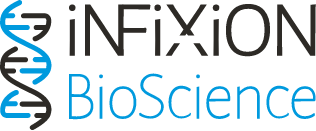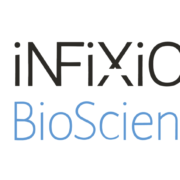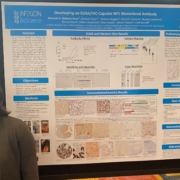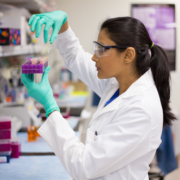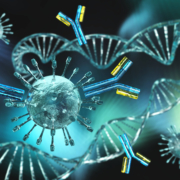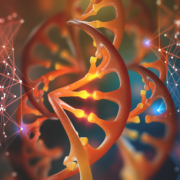(Philadelphia, PA – June, 2022)
iNFixion is working to discover a new therapeutic for Neurofibromatosis (NF1) by correcting for the lack of normal NF1 protein (neurofibromin), a problem that happens to people born with a mutation in the NF1 gene. One key tool in measuring NF1 protein is the monoclonal antibody (mAb), of which high quality versions simply are not available today. After launching a project in late 2019 to pursue the design and development of a new and improved mAb for NF1 protein, iNFixion was proud to present its initial research at the annual NF Conference, sponsored by the Children’s Tumor Foundation (CTF), in Philadelphia, PA from June 17-21, 2022.
Mutations in the NF1 gene result in a lack of normal NF1 protein, a condition known as protein haploinsufficiency and which drives NF1 symptoms. As a start-up company, iNFixion is working to identify drugs that restore normal NF1 protein expression levels, thus treating and preventing a wide range of symptoms attributed to NF1. In order to do this, it is critical to have accurate measurement tools for neurofibromin that are both selective (recognize only NF1) and sensitive (can detect small amounts and changes). In research presented by our Principal Scientist Dr. Michelle Mattson-Hoss (project PI), the new antibody was shown to provide highly selective and sensitive detection of neurofibromin, and to do so across a variety of important assay methods, including western blotting, ELISAs, and immunohistochemistry (IHC). The antibody is performing superior to current commercially available NF1 antibodies, and has now also gone through an exhaustive IHC qualification study executed by Dr. Michael Frost, a board certified pathologist and scientific advisor to iNFixion.
Partially funded by a grant from the Neurofibromatosis Therapeutics Acceleration Program (www.n-tap.org), iNFixion partnered on this project with Abterra Biosciences, a San Diego-based company using state-of-the-art antibody discovery technology, and pioneered the use of full length NF1 protein (as the antibody immunogen) which had been recently developed by the Frank McCormick Lab at UCSF in collaboration with Dr. Dominic Esposito of the Frederick National Lab.
This new antibody provides a significant advance in the ability of NF researchers to study NF1 protein expression. As noted by iNFixion’s CEO, Herb Sarnoff: “Once available, this new NF1 monoclonal antibody should prove valuable in a wide range of NF1 drug discovery efforts, including any therapy targeting the restoration of NF1 protein levels.” With further validation of antibody performance, including monitoring manufacturing variation, and assessing cross reactivity with NF1 protein in other species, iNFixion is now working to deliver this valuable new tool to NF1 researchers worldwide by early 2023, thus helping to drive continued progress toward treatments for NF1.
